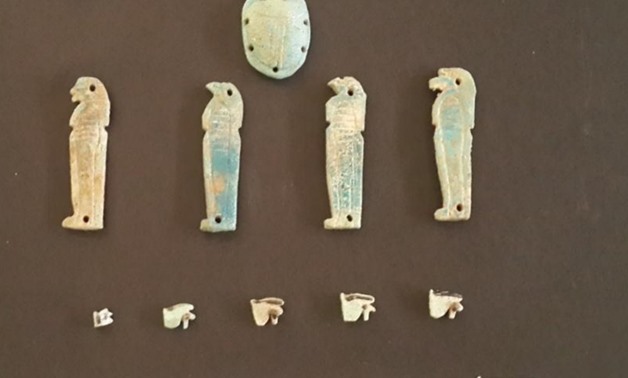
Egyptian archeological mission working at the Aga Khan site in Aswan’s west bank since 2014 has discovered 20 tombs-Ministry of Antiquities'official Facebook Page
CAIRO - 20 September 2018: An Egyptian archeological mission working at the Aga Khan site in Aswan’s west bank since 2014 has discovered 20 tombs from the Graco-Roman period, late ancient Egypt and early Christianity.
Director of Aswan and Nubian Antiquities, Abdel-Moneim Saeed, said that the uncovered tombs vary in their architectural styles, inscriptions and drawings on sarcophaguses, statues and mummies.
Saeed referred that a committee was formed to examine the condition of the artifacts to be exhibited in different museums.
 Egyptian archeological mission working at the Aga Khan site in Aswan’s west bank since 2014 has discovered 20 tombs-Ministry of Antiquities'official Facebook Page
Egyptian archeological mission working at the Aga Khan site in Aswan’s west bank since 2014 has discovered 20 tombs-Ministry of Antiquities'official Facebook Page
The most recent discoveries, found by the mission during excavation works carried out near the Aga Khan mausoleum on Aswan's west bank, was a tomb dating back to the late period of ancient Egypt. The tomb contained a sculpted sandstone sarcophagus with a well-preserved mummy wrapped in linen among other things, the Egyptian archeological mission announced on Tuesday, September 18.
 Egyptian archeological mission working at the Aga Khan site in Aswan’s west bank since 2014 has discovered 20 tombs-Ministry of Antiquities'official Facebook Page
Egyptian archeological mission working at the Aga Khan site in Aswan’s west bank since 2014 has discovered 20 tombs-Ministry of Antiquities'official Facebook Page
Secretary-General of the Supreme Council of Antiquities Mostafa al-Waziri added that three other tombs were found in the area where remains of clay sarcophagi were unearthed, some of which have paintings while others are inscribed with hieroglyphic texts.
Saeed further remarked that during the archaeological cleaning of the tomb the mission found a collection of mummies haphazardly buried, suggesting that the tomb was used as a communal burial.
He pointed out that the head of an unidentified sandstone statue was also uncovered along with a collection of amulets made of faience.
This comes as part of several discoveries made in Aswan, particularly in the Temple of Kom Ombo. Ahmed Sayed, general manager of Kom Ombo antiquities sector, referred that since the Egyptian archaeologists started draining water from the Temple of Kom Ombo on October 18, many artifacts have been uncovered.
The most recent artifact was the sandstone sphinx likely dating to the Ptolemaic era, according to Ministry of Antiquities on September 16.
Furthermore, two ancient pieces were discovered in the Temple of Kom Ombo, Aswan. The two pieces are made of sandstone and belong to King Ptolemy XII; one of them is dome-shaped and topped with a sun disk bearing the image of Ptolemy XII and his wife Cleopatra V with their daughters. The piece contains 29 lines of hieroglyphic writing.
The other piece has the image of Ptolemy XII holding a whip in one hand and a prisoner in the other before the triad of Kom Ombo. The piece also features two texts; 29 lines of hieroglyphic writing and 33 lines of Demotic writing.



Comments
Leave a Comment